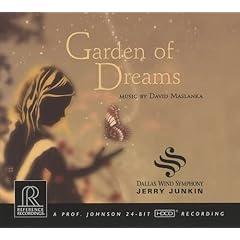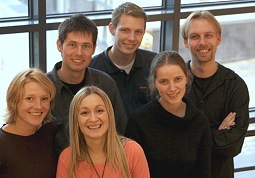 Garden of Dreams
Garden of Dreams
David Maslanka
Dallas Wind Symphony
Jerry Junkin
Writing for a large ensemble, especially a traditional, professional orchestra, can be a dangerous venture for today’s composer. Hours, days, and years (sometimes) of composition, orchestration, preparation of parts, and personal anguish over a score that may get two hours of concert hall rehearsal before a world premiere. However, should a wind ensemble ever ask for a commission, quickly say yes. Wind ensembles (symphonies, bands, etc), particularly collegiate groups, are gifted with practice time enviable by any orchestra and their directors tend to be excited about new music.
Jerry Junkin and the Dallas Wind Symphony have released 77 minutes of music by David Maslanka on the Reference Recordings label, proof that composers can get a break in today’s “orchestra-eat-composer” world. As far as I can tell, this recording was completely underwritten by someone other than the David Maslanka, and the performance quality leaves nothing to complain about.
The music itself combines Bach chorales as “emotional focal points” (composers words) and influences of John Adams, with long droning phrases and chords that build over time. The spaces can be wide, with little motion, but when David writes fast music, it it engaging and purposeful. A Child’s Garden of Dreams is based on the work of Carl Jung, and freely “describes” five dreams of a young girl who died of disease. In Memoriam is based on Bach’s “If Thou but Suffer God to Guide Thee.” The concluding work on this disc is a symphony, and is full of references to Bach chorales and hymn tunes, is predictable and forced (with a glaring reference to Philip Glass about two minutes into the first movement).
 Lion’s Eye/Lion’s Tale
Lion’s Eye/Lion’s Tale
Pauline Oliveros
The Berkley Gamelan Ensemble
Carter Scholz, HTML programmer and sampler performer
Pauline Oliveros, composer-performer, has been a transforming force in music since 1961. Her broad range of activities, from Deep Listening (Oliveros’ orginal concept) to performances on her just tuned accordion, have made her a unique and compelling voice in modern composition.
By their very nature, Oliveros’ works can’t be reviewed. Each performance is different and “correct,” with limitless freedom for the performers. The Berkeley Gamelan Ensemble with Carter Scholz using a sampler, tackles the forty-five minute Lion’s Eye from 1985. Oliveros’ writes for gamelans in a way that suits each instrument. Higher pitched instruments are given more notes, while lower pitched are given longer note values. The sampler allows patterns and pitches to be repeated or sustained at impossible levels, but also participates with the ensemble as another member.
Lion’s Tale for sampler (1989) uses composer created patterns that are generated by computer, allowing for a unique performance each time.
 tic
tic
Common Sense Composers’ Collective
New Millennium Ensemble
Rarely does one see the intentional joining of forces between composers. The competitiveness found in the performing arena is common in the composers’ world, though more passive-aggressive. Unfortunately, our animal desire to survive and rise above the pack isolates and divides us. So when a composers collective comes along, it can be refreshing to observe the fruits of friendship as expressed in the latest release through Albany Records of the Common Sense Composers’ Collective and the New Millennium Ensemble.
The performances by the New Millennium Ensemble are exciting and energetic (not to mention the very fine sound engineering). The composers represent an era influenced by Reich and Adams, jazz and rock, filtered through Guggenheims and Ivy League educations. Nothing sounds academic or contrived, and even when the post-minimalist clichés are apparent, the intensity and motivation behind the performance makes each work on this disc worthwhile.
 Claus is another composer I ran into on Myspace, and we’ve been corresponding for a few months now. Gahrn began his musical studies as a classical guitarist; from 2001 he studied composition and electroacoustic music at the Academy of Music in Esbjerg, Denmark, earning his MA degree with distinction in 2006. That’s Claus on the right in the photo, with his own young ensemble (including his pianist wife Malwina). There are links above that will take you both to Claus’ personal site, as well as that of the ensemble itself. Under “Media” at either, you’ll find excellent MP3 recordings and performances of Gahrn’s often-introspective yet just-as-often-edgy work.
Claus is another composer I ran into on Myspace, and we’ve been corresponding for a few months now. Gahrn began his musical studies as a classical guitarist; from 2001 he studied composition and electroacoustic music at the Academy of Music in Esbjerg, Denmark, earning his MA degree with distinction in 2006. That’s Claus on the right in the photo, with his own young ensemble (including his pianist wife Malwina). There are links above that will take you both to Claus’ personal site, as well as that of the ensemble itself. Under “Media” at either, you’ll find excellent MP3 recordings and performances of Gahrn’s often-introspective yet just-as-often-edgy work. Columbia University’s School of the Arts has given
Columbia University’s School of the Arts has given  Out my (Seattle) way, local composer and Seattle Weekly columnist Gavin Borchert this week offered up something titled “
Out my (Seattle) way, local composer and Seattle Weekly columnist Gavin Borchert this week offered up something titled “
 Garden of Dreams
Garden of Dreams Lion’s Eye/Lion’s Tale
Lion’s Eye/Lion’s Tale tic
tic Here’s a programming note to remember.
Here’s a programming note to remember.  Watching Olga Neuwirth’s opera Lost Highway is like watching a Harry Potter movie after having read the book: the material transfers all right, but one wishes the team behind the retelling had gone further in re-imagining the original work for a new medium. Lost Highway follows David Lynch’s movie more or less scene for scene: many images from the film get repeated on stage, and many lines from the screenplay find their way – sometimes awkwardly – into the libretto (written by Neuwirth and Elfriede Jelinek). Neuwirth’s principal musical conceit is to have Fred and Renee – the dull, troubled couple – speak their lines, while Pete and Alice – the sexy, transformed version of the same couple – sing theirs. This sounds promising in the program notes, but in reality Neuwirth doesn’t follow through: the majority of the lines in the opera – including those belonging to Pete and Alice – are spoken. What lines are sung come across often as labored and sluggish, rather than fantastical and intense. Neuwirth adopts a highly melismatic approach to setting the text, and this approach, while it blends well with her very ambient score, has the undesirable consequence of suddenly retarding the action on stage. Seeing as many of the most emotive and seemingly “operatic” lines are spoken, one wonders how and why she really chose what to have sung.
Watching Olga Neuwirth’s opera Lost Highway is like watching a Harry Potter movie after having read the book: the material transfers all right, but one wishes the team behind the retelling had gone further in re-imagining the original work for a new medium. Lost Highway follows David Lynch’s movie more or less scene for scene: many images from the film get repeated on stage, and many lines from the screenplay find their way – sometimes awkwardly – into the libretto (written by Neuwirth and Elfriede Jelinek). Neuwirth’s principal musical conceit is to have Fred and Renee – the dull, troubled couple – speak their lines, while Pete and Alice – the sexy, transformed version of the same couple – sing theirs. This sounds promising in the program notes, but in reality Neuwirth doesn’t follow through: the majority of the lines in the opera – including those belonging to Pete and Alice – are spoken. What lines are sung come across often as labored and sluggish, rather than fantastical and intense. Neuwirth adopts a highly melismatic approach to setting the text, and this approach, while it blends well with her very ambient score, has the undesirable consequence of suddenly retarding the action on stage. Seeing as many of the most emotive and seemingly “operatic” lines are spoken, one wonders how and why she really chose what to have sung. Since it’s opera week here at Sequenza 21 and there’s a lot of chatter in the comments about transplanting operas between cultures and Galen has raised the topic of fugues in the invisible YouTube video below, it seems somehow fitting to mention that
Since it’s opera week here at Sequenza 21 and there’s a lot of chatter in the comments about transplanting operas between cultures and Galen has raised the topic of fugues in the invisible YouTube video below, it seems somehow fitting to mention that 